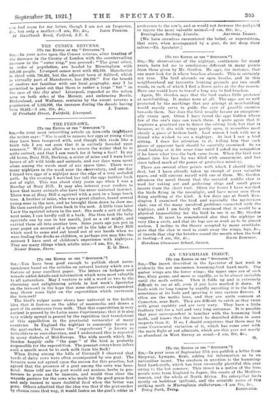THE FERN-OWL.
(To THE EDITOR OF THE " SPECTATOR. "1 Sie,—In your most interesting article on fern-owls (nightjars) the writer says : " She is said to remove her eggs or young when they have been tampered with, and though this reads like a fairy tale I am not sure that it is entirely founded upon romance." Will you allow me to assure the writer that he is quite correct, and that I can vouch for it being a fact? In my old home, Bury Hill, Dorking, a sister of mine and I were keen lovers of all wild birds and animals, and our days were spent alone among the woods most of our spare time. There were many nightjars in the wood near the observatory, and one day I found two eggs of a nightjar near the edge of a very secluded path. In the evening I watched her roll the eggs further back out of sight. This was about sixty years ago when I was a Barclay of Bury Hill. It may also interest your readers to know that many animals also have the same maternal instinct. There was at Bury Hill a squirrel with a nest in a large beech tree. A brother of mine, who was a great climber, found several young ones in the nest, and he brought them down to show me. He then carefully put them back in the nest. A. little time later I saw the squirrel return to the nest. She made a sort of indig- nant noise, I can hardly call it a bark. She then took the baby squirrels one by one in her mouth, just as a cat might, and carried them all into another tree. Some years ago you put in your paper an account of a tame eel in the lake at Bury Hill which used to come and eat bread out of our hands when we were feeding the ducks as children, so perhaps you may like the account I have sent of children's experience with nightjars. They see many things which adults miss.—I am, Sir, &c.,


































 Previous page
Previous page